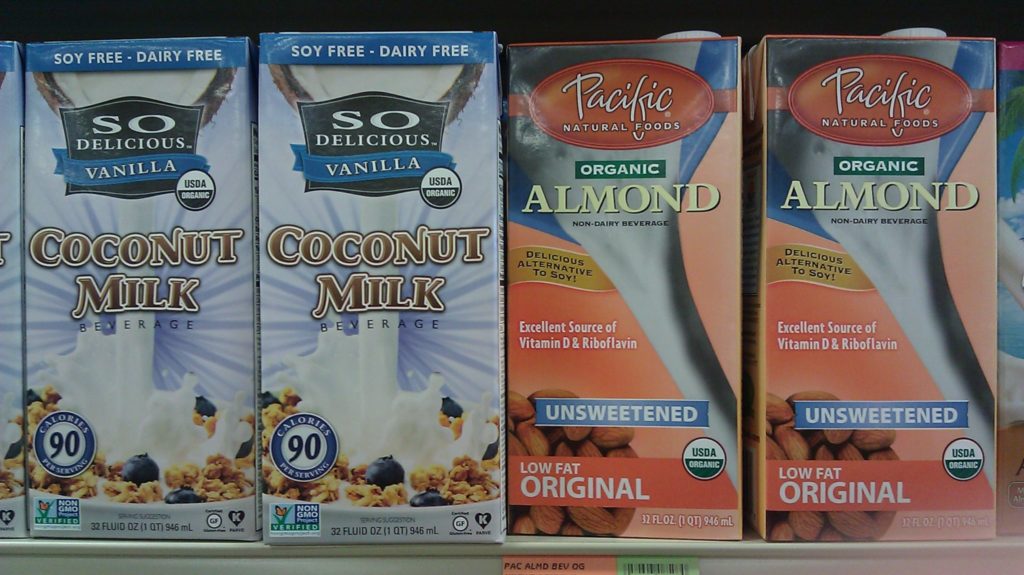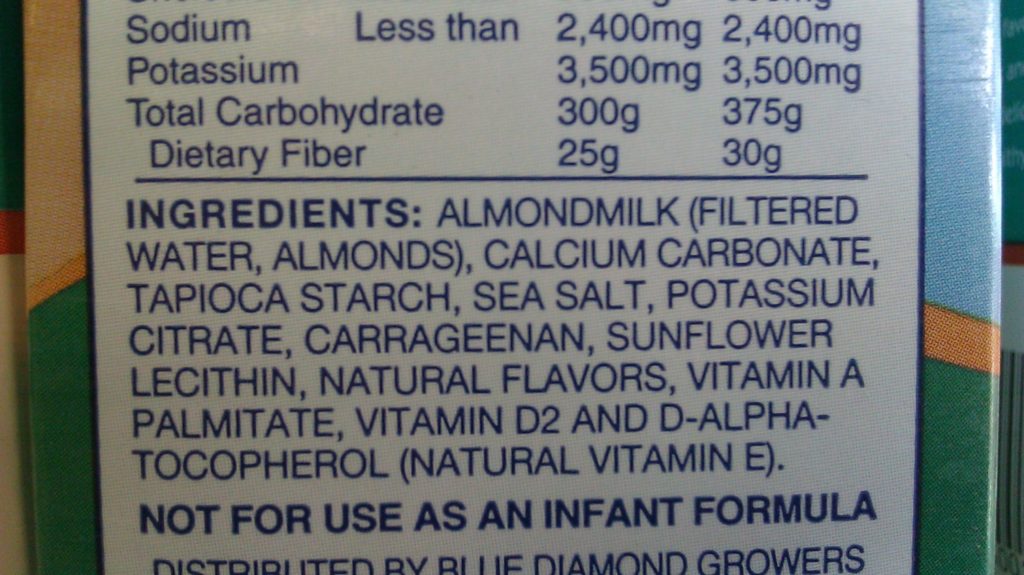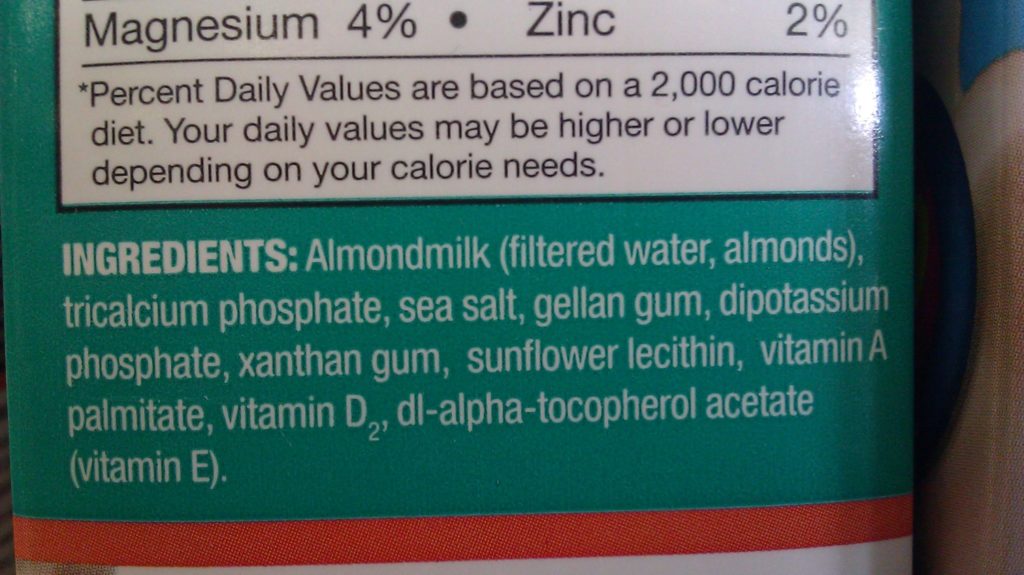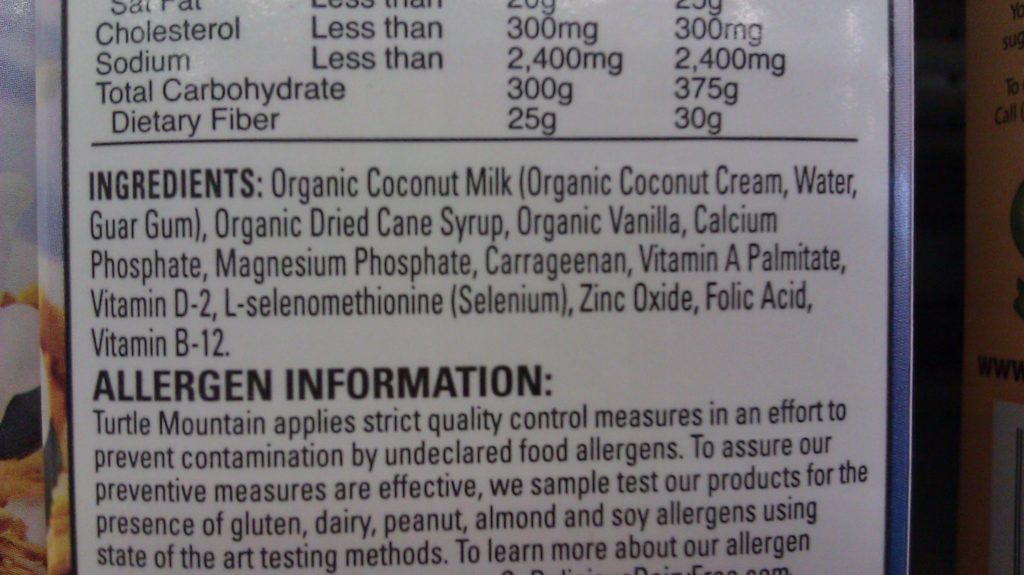 Organic coconut milk and almond milk are common purchases at the health food store by those with dairy allergies. Usually, these people are savvy consumers who know enough nutritionally to avoid soy milk with its endocrine disrupting isoflavones and gastric inflaming phytates. Rice milk is also steadily declining in popularity as it is really not much more than a glass of sugar water nutritionally speaking.
Organic coconut milk and almond milk are common purchases at the health food store by those with dairy allergies. Usually, these people are savvy consumers who know enough nutritionally to avoid soy milk with its endocrine disrupting isoflavones and gastric inflaming phytates. Rice milk is also steadily declining in popularity as it is really not much more than a glass of sugar water nutritionally speaking.
Organic, unsweetened coconut milk and almond milk in cartons seem like great alternatives at first blush, but are they really as “healthy” as people believe?
Let’s take a look at the labels. I was shocked at what I found.
Check out the labels of the three brands I photographed. I checked all the brands, by the way, and they all contained the same dangerous additives I’m about to describe.

First, Vitamin A Palmitate is added, the synthetic version of Vitamin A. I personally avoid synthetic versions of Vitamin A like the plague. Every single multi-vitamin I’ve ever examined contains some form of synthetic A, including the so called “whole foods” multis.
Synthetic vitamins are the chemical mirror images of the real, natural versions. They can cause imbalances over time. Even small amounts of the synthetic fat soluble vitamins like Vitamin A can prove toxic and should be strictly avoided!
The Organic Consumers Association warns that isolated vitamins such as those produced synthetically cannot be recognized or metabolized by the body in the same way as the natural version.

Large doses of natural vitamin A are well tolerated by the body as established by researchers decades ago, however. Traditional diets contain 10 times or more of the RDA of this nutrient with no ill effect. However, synthetic vitamin A is associated with birth defects and bone fractures. It has no benefit in the diet whatsoever.

The second really bad additive in these organic cartons of coconut milk and almond milk is Vitamin D2. Vitamin D2 is a form of the wonder vitamin that you should take great pains to avoid.
In all known cases of Vitamin D toxicity where the dose was intentional, Vitamin D2 was the culprit. By comparison, Vitamin D3 is much less toxic and requires an enormous or even an accidental dose to produce any toxic effect.
Vitamin D2 is manufactured industrially by irradiating yeast. It is dangerous for D2 to be added to any food product particularly if this product would be given to children, where toxicity symptoms would appear at much lower dosages.
None of the store brands of cartoned coconut milk or almond milk were free of these dangerous and synthetic versions of the fat soluble vitamins!
Notice also that carrageenan is present in 2 of the 3 products as well! Dr. Andrew Weil has been telling people to avoid carrageenan since 2002.
Carrageenan is so toxic and inflaming to the human digestive system that this food additive is formally classified by the International Agency for Research on Cancer (part of the World Health Organization) as a potential human carcinogen.
In my view, it would be a mistake to purchase and consume these items. They are in no way health promoting or beneficial, particularly for growing children!
Healthy Alternatives to Coconut Milk and Almond Milk in Cartons
Coconut milk and almond milk should be healthy and they can be if they are produced at home without these dangerous additives. I wrote an in depth post on how to easily make these nondairy beverages yourself. This recipe for wild rice milk is a good option as well.
Believe it or not, even organic coconut milk in BPA free cans would be a better alternative to cartons of coconut milk based on my label inspection!
Check out my video on homemade coconut milk and my article on how to make healthy DIY almond milk, fermented to add probiotics and enzymes to boost immunity and improve digestion.
Sarah, The Healthy Home Economist
Sources
From Seafood to Sunshine: A New Understanding of Vitamin D Safety








No!! Just when I thought I found something that works.. *sigh* And the list of things you can buy at the grocery store gets smaller. I live in a terrible area for fresh, local, organic. Not to mention, its not legal to sell raw milk.
Funny, we just bought some almond milk yesterday. We’ve stopped drinking cow’s milk, and DH wanted a substitute. I tried a sip of it, and the first thing I noticed was how sweet it was. Sure enough- sugar was the second ingredient- and that was in the “original” flavor. :/
Bummer, hubby can’t have dairy and we’ve been drinking this stuff like crazy lately. I’ve given it to my kids too.
thehealthyhomeeconomist If you don’t take prenatals, then do you just rely on your food for nutrition? I know that’s ideal, and I eat very healthy, but didn’t think it was enough. I take standard process supplements and a prenatal from my alternative dr.
Kristen, I think the goal is always whole food. But sometimes it is hard to get everything from your diet, so adding a whole food supplement bridges the gap. Make sure you use one that has peer reviewed published research on the product itself. I found a great one at http://www.thankfulforjuiceplus.com
thehealthyhomeeconomist If you don’t take prenatals, then do you just rely on your food for nutrition? I know that’s ideal, and I eat very healthy, but didn’t think it was enough. I take standard process supplements and a prenatal from my alternative dr.
How long does the homemade almond milk last in the fridge? Do u just make it in small batches?
This is so sad! I’m 31 weeks pregnant & have a sensitivity to cow’s milk so have been drinking coconut & rice milk during my pregnancy. 🙁 I had no idea!
Coconut and Almond Milk in Cartons Not a Healthy Buy – The Healthy Home Economist http://t.co/5n0JnBAU
So, what would be the NONsynthetic form of vitamin A? I just went to Pacific’s website and wrote to them (not easy, they give you one little short line) asking them to remove these things from their oat, almond, etc., products (the “natural flavors,” vitamin D2, and vit A). I encourage everyone else to contact them also. It didn’t take but a minute. They need to know what some of their customers think and that we will no longer purchase the item? Been drinking this brand for years. Sigh.
My vitamins are a FAIL! No wonder… ugh.